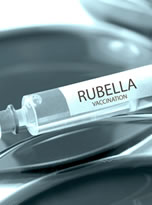Read and report vaccine reactions, harassment and failures.

Quick Facts
Rubella
- Rubella, also known as
German measles
orthree-day measles
, is a mild viral infection that primarily occurs in childhood but can also affect adults. Symptoms may begin with a mild fever, runny nose, sore throat, swollen lymph nodes and progress to a pink rash that starts on the face and spreads to the neck, arms, chest and sometimes the legs, disappearing as it moves downward on the body. The rash is not as red or blotchy as measles and generally fades by the third to fifth day. About 25 to 50 percent of rubella infections are asymptomatic; - Young adults, especially young women, who are infected with rubella may have swollen glands in the back of the neck and joint pain, swelling and stiffness (arthritis) that lasts for several weeks. Rarely, more serious complications of rubella, including brain inflammation and chronic arthritis, may occur;
- Rubella is a respiratory infection that is spread from person-to-person through coughing and sneezing. The virus can be found in an infected person’s throat, nose, urine, cerebral spinal fluid and blood;
- Incubation period from exposure to symptoms is 12 to 23 days. Recovery from rubella usually confers lifelong immunity, although there are rare reports of repeat cases;
- While mildly contagious and usually not a serious infection for the majority of individuals, women infected with rubella during the first three months of pregnancy are at higher risk for miscarriage and of giving birth to a baby with congenital rubella syndrome (CRS) and birth defects. Infants born with CRS can suffer from deafness, blindness, heart defects, developmental delay, small head size and other serious health problems.
Rubella Vaccine
- There are three rubella vaccines currently in use in the United States. Two vaccines, MMRII, manufactured by Merck, and PRIORIX, manufactured by GlaxoSmithKline, are combination measles-mumps-rubella (MMR) live virus vaccines. The third, ProQuad, manufactured by Merck, is a combination measles-mumps-rubella-varicella (MMR-V) live virus vaccine. The CDC recommends children receive the first dose of MMR vaccine between 12 and 15 months of age, and the second dose between four and six years of age.
- Mild side effects such as redness, rash or pain at the injection site, along with fever and swelling of the glands in the neck or cheeks have been reported following MMR and MMR-V vaccination.
- Serious vaccine side effects include shock, encephalitis, convulsions (seizures), encephalopathy, thrombocytopenia purpura (blood clot disorder), arthritis, optic neuritis, lupus, Guillain-Barre syndrome (GBS), aseptic meningitis, deafness, gastrointestinal disorder, cardiomyopathy, transverse myelitis, and subacute sclerosing panencephalitis;
- As of April 1, 2024, there have been 1,397 claims filed in the federal Vaccine Injury Compensation Program (VICP) for injuries and deaths following rubella (MMR, MMR-V, Mumps-Rubella, Rubella) vaccination, including 70 deaths and 1,327 serious injuries.
- Using the MedAlerts search engine, as of March 29, 2024, there have been 112,776 reports of rubella vaccine (MMR, MMR-V, Mumps-Rubella, Rubella) reactions, hospitalizations, injuries and deaths following rubella vaccinations made to the federal Vaccine Adverse Events Reporting System (VAERS), including 520 related deaths, 8,549 hospitalizations, and 2,190 related disabilities. Nearly 64 percent of rubella vaccine-related adverse events occurred in children under the age of six years.
NVIC “Quick Facts” is not a substitute for becoming fully informed about Rubella and the Rubella vaccine. NVIC recommends consumers read the more complete information contained the vaccine manufacturer product information inserts, the links provided in our Quick Facts, and speak with one or more trusted health care professionals before making a vaccination decision for yourself or your child.
Food & Drug Administration (FDA)
- Measles, Mumps and Rubella Virus Vaccine, Live (MMRII). Product Insert & Licensing Information
- Measles, Mumps and Rubella Vaccine, Live (PRIORIX). Product Insert & Licensing Information
- Measles, Mumps, Rubella and Varicella Virus Vaccine Live (ProQuad). Product Insert & Licensing Information
Centers for Disease Control (CDC)
- CDC on Rubella Disease
- CDC on Rubella Vaccination
- Rubella Vaccine Information Statement (VIS) MMR
- Rubella Vaccine Information Statement (VIS) MMRV
Vaccine Reaction Symptoms & Ingredients
Our Ask 8, If You Vaccinate webpage contains vaccine reaction symptoms and more.
Search for Vaccine Reactions
NVIC hosts MedAlerts, a powerful VAERS database search engine. MedAlerts examines symptoms, reactions, vaccines, dates, places, and more.
Reporting a Vaccine Reaction
Since 1982 NVIC has operated a Vaccine Reaction Registry, which has served as a watchdog on VAERS. Reporting vaccine reactions to VAERS is the law. If your doctor will not report a reaction, you have the right to report a suspected vaccine reaction to VAERS.
IMPORTANT NOTE: NVIC encourages you to become fully informed about Rubella and the Rubella vaccine by reading all sections in the Table of Contents, which contain many links and resources such as the manufacturer product information inserts, and to speak with one or more trusted health care professionals before making a vaccination decision for yourself or your child. This information is for educational purposes only and is not intended as medical advice.



